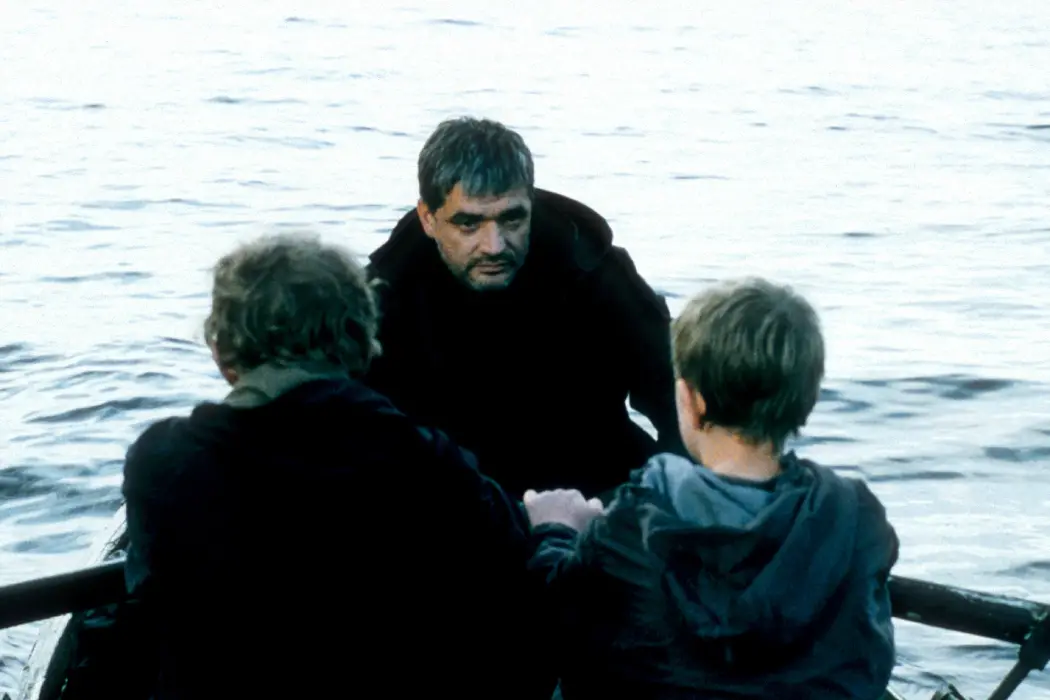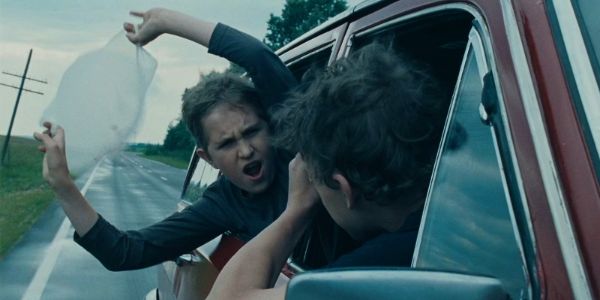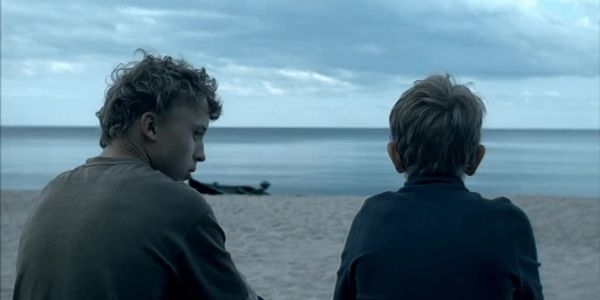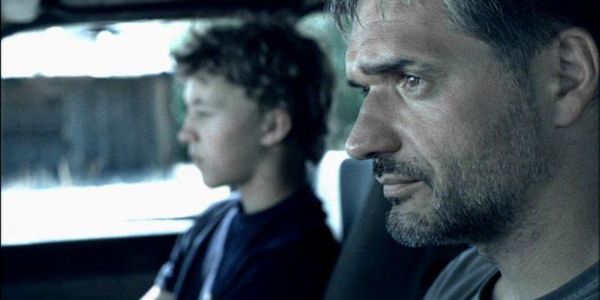The Meaning of Fathers and Sons: On Andrey Zvyagintsev’s THE RETURN

Data analyst living in Manchester. Writes for Film Inquiry, The…
Following the recent discovery of my dad’s biological family, after years of me being the only person he knew who shared his blood, a confusing set of questions presented themselves. The more abstract theories of what family really is – nature or nurture? – occupy my mind when I hear him talk about his “brother” or his “birth mother”. But my dad couldn’t care less. He is too caught up in the joy of finally finding an answer to a question that many of us have no need to consider. For my dad, the questions are not philosophical, but practical. If you are lucky enough to be brought up by decent people, the law of loving your family is easy to follow. But time also precipitates the growth of this supposedly natural connection. When suddenly you think that you have to love a stranger in the same way, there aren’t many people who can offer guidance as the laws blur.
“Who?” is the first question that boys Andrei and Ivan ask their mother when she tells them that their father has returned. Andrey Zvyagintsev’s debut The Return (2003) begins with this deceptively obvious question and gradually exposes the pain that fatherless boys experience, especially the conflict that is inherent when a historically absent father decides to play dad. The two boys approach their profound confusion from different directions: one is resentful and the other is desperate not to lose him again. The dynamic between the three is a male one – of uncomfortable vulnerability, pride and stubbornness. Each of them holds two conflicting realities in their head as they drive across a small corner of Russia imbued by Zvyagintsev with Tarkovskian beauty. But these opposing realities begin to tear apart their father’s simplistic attempt to connect, because to Andrei and Ivan he is still only a father by blood.
Andrei
Andrei, the older brother, and Ivan, the younger, clash like adolescent boys do, but their roles as brothers and as sons are never fixed; no linear character transformations take place between the opening scene and the final one. In fact, their behaviour and developing personalities are constantly in flux throughout the film. Once their father shows himself, Andrei stares wide-eyed at this large, strange man sitting next to him at the dinner table. The man pours Andrei a glass of wine, who gulps it down – after his mother has poured some water into the glass – and asks if he can have some more, assuming it will please his father after Ivan has expressed his dislike. Andrei’s behaviour bares a young man who is so anxious not to displease his father in case he might leave again. But this is why his father instinctively prefers Ivan, even as Ivan is so stubbornly defiant.

While desperation is his dominant mode, Andrei’s developing maturity surfaces at times when it’s clear that Ivan is the one really struggling to accept this cold man as his father. As brothers brought up by a single mum, they are each other’s father, doing the best they can to lead the other when one of them has found the right path. Their closeness is never spoiled by their fairly frequent bickering, just like any loving siblings. When held in the frame together, their connection glows in the space between them. Zvyagintsev captures in one image the Bergman model: one face cut across the other, each boy contemplating the very moment they are in while looking in different directions.
Boys crave an adult male figure, even if their mother can carry, as many must do, the burden of both roles. Andrei and Ivan’s mother, seen very little in The Return, is ostensibly a minor character. She is not seen again in person once the boys are taken on their fishing trip by a man who tells them to call him “Papa”. Andrei didn’t have to be told, he says it for the first time at the dinner table without hesitation. However, just as his attempts at conventional manliness are unconvincing, Andrei tries to answer the question of “Who?” by treating this man, not like a stranger, but almost immediately as if he is his father as if there is a bond predetermined by their shared DNA. He is still a child, so what this approach means for Andrei is that he spends more of his time confused and hurt rather than comforted, especially when his father shows him only strictness or violence.
Ivan
Ivan is petty, but he is also twelve. And both are sensitive, artistic boys who take turns writing in a shared diary and capturing candid photographs of their trip. They were clearly brought up well by a loving mother. Knowing that their father has been absent for at least twelve years, their passion and resilience are a reflection of their upbringing. However, their different reactions to their father come from their different emotional responses to the pain they suddenly realize was always there, after being told that there is a man who had more important things to do than be their father. Ivan is suspicious but is forced to call his father “Papa”.
Behaving for much of the film as if he is trying to protect Andrei and himself from this stranger, Ivan is sometimes unable to contain his confusion. With time to themselves in their tent, he cries to his brother, “How do I know he’s our dad? Why do you believe him?”. Andrei’s answer is convincing: “Mum says he’s our father.” Hearing Ivan cry in the dark, Andrei suggests they go fishing just the two of them in the morning. Regardless of their father, Ivan is upset with his older brother for not taking his side – he is unable to appreciate that Andrei’s behaviour is just as confused as his.

Whether Ivan realizes it or not, his connection to his father, buried under the stoicism of hard-faced masculinity, becomes an immensely touching back-and-forth primarily expressed through their arguments. Andrei is the one who is beaten, but Ivan is the one who can leave his father speechless with shame. Upon my second viewing, I again wished that Ivan would give his father and brother a break, but I can only make this judgement as a witness distanced by the screen from their delicate and complex situation. After an argument that leaves Ivan abandoned on a bridge in the middle of nowhere, shivering in the rain, he finally expresses from the back seat of the car what’s tormenting him: “Tell me why you came. Why did you make us come? You don’t need us!” The father, his face unchanged, is unable to look back at his son’s tears.
Father
The father’s cluelessness gradually becomes apparent as the three of them grow more frustrated with each other. He clearly wants to be a dad to his two boys, but this role is also new to him. When he tries to instruct Ivan and Andrei on their manners or their practical skills, his desire to be respected is demonstrated by his coldness. By wanting to teach his boys these lessons, this is his way of showing that he cares, and the violence is nothing but him losing his sense of authority. The father openly expresses his desire to be their dad just once, but more powerful are his eyes that, when faced with Ivan’s incredulity, say, “I’m here now, isn’t that enough?”

There is no explanation of where he has been all this time, but the few clues scattered throughout the film serve multiple theories, some political, some mystical. He makes suspicious phone calls at every stop, and at one point the trip is almost canceled because of his “work”. The father decides to take Ivan and Andrei with him instead, to an uninhabited island with a small shack built in the middle of a green and goldfield. But all this mystery only reinforces the boys’ misunderstanding of him. Devastatingly, some of Ivan’s last words to his father are, “If you weren’t so evil, I could love you like a father!”
Conclusion
Vladimir Garin, the fifteen-year-old boy who played Andrei, drowned not long after filming, denying him the chance to celebrate his part in The Return’s acclaim, notably when it received the Golden Lion at the Venice Film Festival in 2003. It can be daunting to witness child actors perform with such genuine emotion, the kind many adults would fail to understand in real life. Andrey Zvyagintsev, one of Russia’s greatest living filmmakers, owes a lot to Garin and Ivan Dobronravov’s performances. Konstantin Lavronenko, who plays the father, would go on to win the Best Actor prize at the 2007 Cannes Film Festival for Zvyagintsev’s follow-up The Banishment, another mythical portrait of a broken family.
Family is central to Andrey Zvyagintsev’s work, as much as working directors like Mike Leigh or Hirokazu Kore-eda. But Zvyagintsev’s style is where he distinguishes himself: it’s cold Russian mysticism bound by reality, both so well constructed that they form a single stylistic unit. As a film about fathers and their sons, The Return is about the difficulty certain men have expressing love for one another. It is a love as complicated as any of its many forms, but within this relationship can be the question of what it means to be a man, especially one who doesn’t feel comfortable with the sensitivity, as well as the courage, needed to raise young boys.
What’s your favourite Andrey Zvyagintsev film? Let us know in the comments!
Does content like this matter to you?
Become a Member and support film journalism. Unlock access to all of Film Inquiry`s great articles. Join a community of like-minded readers who are passionate about cinema - get access to our private members Network, give back to independent filmmakers, and more.
Data analyst living in Manchester. Writes for Film Inquiry, The State Of The Arts, Vague Visages.













